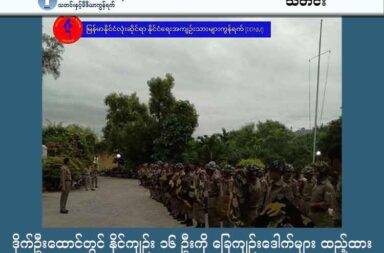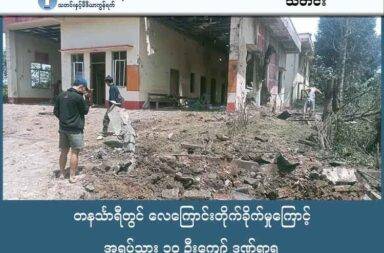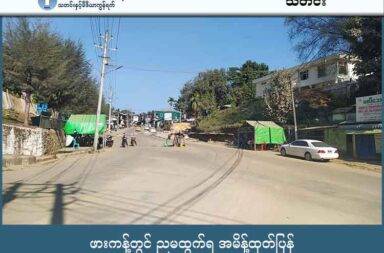Report Calls for Recognition of Indigenous People’s Right to Control Resources
By NETWORK MEDIA GROUP (NMG)
Wednesday, August 28, 2019
Indigenous people in Burma’s ethnic states should be given greater control over resources in their respective territories, according to a new report released by the Kachin Development Network Group (KDNG) last week.
In “Blood Amber,” a report that examines the impact of Burma Army control over the Hukawng Valley amber-mining region in Kachin State, the group argues that the country’s constitution needs to be amended in order to protect the rights of indigenous people.
“Regarding indigenous people’s rights, the government must amend Article 37 of the 2008 Constitution. Article 37(a) and 37(b) must be changed,” Tsa Ji, the general secretary of the KDNG, told NMG.
According to Burma’s military-drafted constitution, all natural resources in the country belong to the state, which alone has the power to decide how they are used.
Article 37(a) of the constitution states that “The Union is the ultimate owner of all lands and all natural resources above and below the ground, above and beneath the water and in the atmosphere in the Union; [Article 37(b)] shall enact necessary law to supervise extraction and utilization of State-owned natural resources by economic forces.”
This notion of ultimate ownership of all resources by the state is rejected by the KDNG and other groups fighting for recognition of indigenous land rights.
“All lands, water and natural resources in Kachin State are owned by the people who live in Kachin State. These things are not owned by the central government. Indigenous people must have decision-making power and managing power over these natural resources. These laws must be changed. Then indigenous people can work to develop their own state,” said Tsa Ji.
If the constitution isn’t changed, there will be no end to conflicts in ethnic states, he added.
“If it cannot be changed, there will be no peace in the country. All people will have to live with conflict forever. We can clearly see the interests of central government and military expansion. To solve these problems, existing laws must be changed.”
Land-grabbing by the Burma Army has also been a problem in other states, including Karenni (Kayah) State, where farmers are facing prosecution for attempting to utilize ancestral lands seized by the military.
“According to Articles 37(a) and 37(b), everything in the country is owned by the government. They don’t respect our rights, our lands, or our way of life. They don’t want to recognize us. They don’t value us. They don’t care about us. If they don’t respect ethnic rights, land problems and conflicts will not go away,” said Khu Tu Reh, the chairman of the Karenni State Farmers’ Union.
Shan Saphawa, a Shan environmental group, said that if these laws are eventually changed, ethnic states will benefit.
“Ethnic States should have self-determination as their ultimate goal. If the process is delayed, the government should focus on protecting the environment, because the environment has been affected by business and other human activities, which are the cause of most problems,” Shan environmentalist Sai Khur Hseng told NMG.
“Blood Amber” was published on August 20.
The report highlights the loss of indigenous people’s rights under Articles 37(a) and 37(b) of the constitution, as well as the impact of Burma Army offensives in the Tanai area of Kachin State, which have dispossessed local people and opened the sensitive Hukawng Valley region to exploitation.


